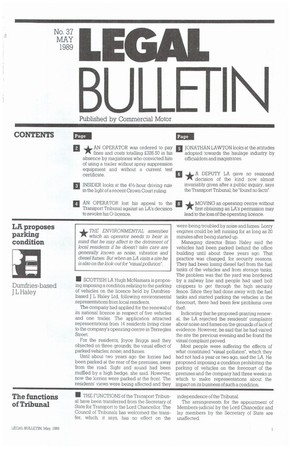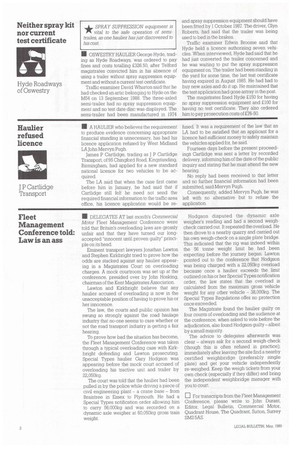LEGAL
Page 111

Page 112

If you've noticed an error in this article please click here to report it so we can fix it.
BULLETIN
AN OPERATOR was ordered to pay Plk Imes and costs totalling £326.50 in his absence by magistrates who convicted him of using a trailer without spray suppression equipment and without a current test certificate.
O INSIDER looks at the 41/2-hour driving rule in the light of a recent Crown Court ruling II AN OPERATOR lost his appeal to the Transport Tribunal against an LA's decision to revoke his 0-licence.
THE ENVIRONMENTAL amenities which an operator needs to bear in mind that he may affect to the detriment of local residents if he doesn't take care are generally known as noise, vibration and diesel fumes. But when an LA visits a site he is also on the look-out for "visual pollution".
• SCOTTISH LA Hugh McNamara is proposing imposing a condition relating to the parking of vehicles on the licence held by Dumfriesbased I L Haley Ltd, following environmental representations from local residents.
The company had applied for the renewal of its national licence in respect of five vehicles and one trailer, The application attracted representations from 14 residents living close to the company's operating centre in Terregles Street.
For the residents, Joyce Briggs said they objected on three grounds; the visual effect of parked vehicles; noise; and fumes, Until about two years ago the lorries had been parked at the rear of the premises, away from the road. Sight and sound had been muffled by a high hedge, she said. However, now the lorries were parked at the front. The residents views were being affected and they • THE FUNCTIONS of the Transport Tribunal have been transferred from the Secretary of State for Transport to the Lord Chancellor. The Council of Tribunals has welcomed the transfer, which, it says, has no effect on the JONATHAN LAWTON looks at the attitudes adopted towards the haulage industry by officialdom and magistrates.
Pg, A DEPUTY LA gave no reasoned decision of the kind now almost invariably given after a public inquiry, says the Transport Tribunal; he "found no facts".
"MOVING an operating centre without first obtaining an LA's permission may lead to the loss of the operating licence.
were being troubled by noise and fumes. Lorry engines could be left running for as long as 20 minutes after being started up.
Managing director Brian Haley said the vehicles had been parked behind the office building until about three years ago. That practice was changed, for security reasons. They had been losing diesel fuel from the fuel tanks of the vehicles and from storage tanks. The problem was that the yard was bordered by a railway line and people had used bolt croppers to get through the high security fence. Sihce they had done away with the fuel tanks and started parking the vehicles in the forecourt, there had been few problems over theft.
Indicating that he proposed granting renewal, the LA rejected the residents' complaints about noise and fumes on the grounds of lack of evidence. However, he said that he had visited the site the previous evening and he found the visual complaint proved.
Most people were suffering the effects of what constituted "visual pollution", which they had not had a year or two ago, said the LA. He proposed imposing a condition prohibiting the parking of vehicles on the forecourt of the premises and the company had three weeks in which to make representations about the impact on its business of such a condition.
independence of the Tribunal.
The arrangements for the appointment of Members-judicial by the Lord Chancellor and lay members by the Secretary of State are unaffected. PkSPRAY SUPPRESSION equipment is vital to the safe operation of semitrailes, as one haulier has just discovered to his cost.
• OSWESTRY HAULIER George Hyde, trad tag as Hyde Roadways, was ordered to pay fines and costs totalling £326.50, after Telford magistrates convicted him in his absence of using a trailer without spray suppression equipment and without a current test certificate.
Traffic examiner David Wharton said that he had checked an artic belonging to Hyde on the M54 on 13 September 1988. The three-axled semi-trailer had no spray suppression equipment and no test date disc was displayed. The semi-trailer had been manufactured in 1974 • A HAULIER who believes the requirement to produce evidence concerning appropriate financial standing is unnecessary, has had his licence application refused by West Midland LA John Mervyn Pugh.
James P Cartlidge, trading as J P Cartlidge Transport, of 95 Chingford Road, Kingstanding, Birmingham, had applied for a new standard national licence for two vehicles to be acquired.
The LA said that when the case first came before him in January, he had said that if Cartlidge still felt he need not send the required financial information to the traffic area office, his licence application would be re 111 DELEGATES AT last month's Commercial Motor Fleet Management Conference were told that Britain's overloading laws are grossly unfair and that they have turned our longaccepted "innocent until proven guilty" principle on its head.
Eminent transport lawyers Jonathan Lawton and Stephen ICirkbright tried to prove how the odds are stacked against any haulier appearing in a Magistrates Court on overloading charges. A mock courtroom was set up at the conference, presided over by John Hosking, chairman of the Kent Magistrates Association.
Lawton and Kirlcbright believe that any haulier accused of overloading is now in the unacceptable position of having to prove his or her innocence.
The law, the courts and public opinion has swung so strongly against the road haulage industry that no-one seems to care whether or not the road transport industry is getting a fair hearing.
To prove how bad the situation has become, the Fleet Management Conference was taken through a typical overloading case with Kirkbright defending and Lawton prosecuting. Special Types haulier Gary Hodgson was appearing before the mock court accused of overloading his tractive unit and trailer by 22,050kg.
The court was told that the haulier had been pulled in by the police while driving a piece of civil engineering plant a crane base from Braintree in Essex to Plymouth. He had a Special Types notification order allowing him to carry 56,000kg and was recorded on a dynamic axle weigher at 60,050kg gross train weight. and spray suppression equipment should have been fitted by 1 October 1987. The driver, Glyn Roberts, had said that the trailer was being used to bed in the brakes.
Traffic examiner Edwin Broome said that Hyde held a licence authorising seven vehicles. When interviewed, Hyde had said that he had just converted the trailer concerned and he was waiting to put the spray suppression equipment on. The trailer had been standing in the yard for some time, the last test certificate having expired in August 1985. He had had to buy new axles and do it up. He maintained that the test application had gone astray in the post The magistrates fined Hyde £150 for having no spray suppression equipment and £100 for having no test certificate. They also ordered him to pay prosecution costs of £76-50.
fused. It was a requirement of the law that an LA had to be satisfied that an applicant for a licence had sufficient money to safely maintain the vehicles applied for, he said.
Fourteen days before the present proceedings Cartlidge was sent a letter by recorded delivery, informing him of the date of the public inquiry and stating that he must attend the new hearing.
No reply had been received to that letter and no further financial information had been submitted, said Mervyn Pugh.
Consequently, added Mervyn Pugh, he was left with no alternative but to refuse the application.
Hodgson disputed the dynamic axle weigher's reading and had a second weighcheck carried out. It repeated the overload He then drove to a nearby quarry and carried out his own weigh-check on a single plate bridge. This indicated that the rig was indeed within the 56 tonne weight limit he had been expecting before the journey began. Lawton pointed out to the conference that Hodgson was being charged with a 22,050kg overload because once a haulier exceeds the limit outlined on his or her Special Types notification order, the law states that the overload is calculated from the maximum gross vehicle weight for any other vehicle 38, 000kg. The Special Types Regulations offer no protection once exceeded.
The Magistrate found the haulier guilty on four counts of overloading and the audience at the conference, when asked to vote before the adjudication, also found Hodgson guilty albeit by a small majority.
The advice to delegates afterwards was clear always ask for a second weigh-check (though this is often refused in practice); immediately after leaving the site find a nearby certified weighbridge (preferably single plate) and get your vehicle independently re-weighed. Keep the weigh tickets from your own check (especially if they differ) and bring the independent weighbridge manager with you to court.
El For transcripts from the fleet Management Conference, please write to John Durant, Editor, Legal Bulletin, Commercial Motor, Quadrant House, The Quadrant, Sutton, Surrey SM2 5AS.
























































































































